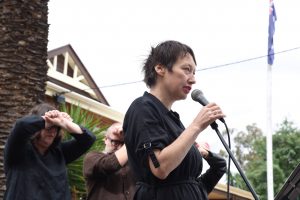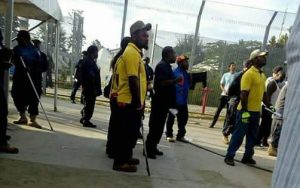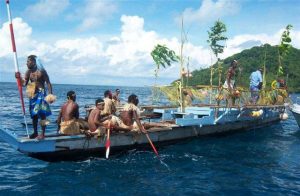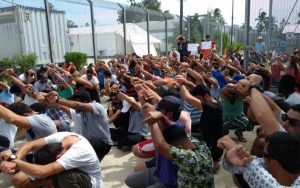The idea of the ‘wild’ is not just the world of undomesticated nature. It is also the inner poetic strength of the human spirit in the face of oppression. For this reason this blog is honouring Behrouz Boochani, the Kurdish-Iranian journalist, writer, cultural advocate, filmmaker and scholar, whom Australia has kept imprisoned on Manus Island for the last 6 years.[vc_row css=”.vc_custom_1544572756227{margin-bottom: -10% !important;}”][vc_column width=”1/2″][vc_single_image image=”700″ img_size=”full” alignment=”center” onclick=”link_image” css_animation=”slideInUp” img_link_large=”Brad Diedrich”][vc_column width=”1/2″]In his extraordinary book, No Friend But the Mountain: Writing from Manus Prison, which stands as one of the great examples of prison literature in the company of people like Nelson Mandela and Alexsandr Sozhenitsyn, he reflects on his flight into exile and the lure of the heroic Peshmerga warriors.[vc_row css=”.vc_custom_1544572784978{margin-top: -10% !important;}”][vc_column_text css=”.vc_custom_1537404413432{margin-top: 10% !important;margin-right: 10% !important;margin-bottom: 10% !important;margin-left: 10% !important;padding-top: 7% !important;padding-right: 7% !important;padding-bottom: 7% !important;padding-left: 7% !important;background-color: #ddc49d !important;}”]For years I had pondered the mountains
For years I had dwelt on the war involving occupiers of the Kurdish homelands
A war against those who had divided Kurdistan between themselves
An occupation that has devastated an ancient culture
An invasion that has decimated what was of cultural value to the Kurds
Destroyed what was cherished by the Kurds
What was necessary for the preservation of Kurdish identity?[vc_column_text css=”.vc_custom_1537452406073{margin-right: 10% !important;margin-bottom: 10% !important;background-color: #ffffff !important;}”]The most extraordinary thing about Boochani’s book is that he found a way through the ‘bars of his prison’ by writing, text message by text message in the Farsi language on a mobile phone, as he consciously sought to create a ‘new philosophical language’, to account for his experience. His writing is rich with cultural, historical and political frames of reference and allusions, using paradox and juxtaposition to create a de-colonial text—an expression of a de-colonial way of thinking and doing. Thus it forms part of the growing body of thinking about the ‘colonialisation of consciousness’ that has accompanied the socio-political hegemony of the Euro-American era.Behrouz Boochani is a political prisoner—guilty of no crime, just the human desire to escape persecution for safe asylum, much the same way the Jewish people fled Nazi Germany to escape their persecution and eventually the death camps that killed 9 million of them.
He explores how domination and control as modes of thinking—thinking that lies at the very foundation of Australia’s own convict colonial white settlement—are related to the aggressive extraction and manipulation of natural resources, the destruction of the ecosystem, and the exploitation of fellow humans, from the crude control of bodies to the digital manipulation of minds, that have become the hallmarks of techno-capitalism.
Boochani identifies this as The Kyriarchal System—an intersecting social system that reinforces and multiplies with the aim of punishing, subjugating and suppressing—the very essence of Australia’s ubiquitous border-industrial complex, which is leaking into the culture wars of modern Australia. It is a system designed to turn one against the other and ingrain even deeper hatred between people in an atmosphere of competition for survival.[vc_column width=”1/2″][vc_single_image image=”701″ img_size=”full” alignment=”center” onclick=”link_image” css_animation=”slideInUp” img_link_large=”Brad Diedrich”][vc_column width=”1/2″]Our Prime Minister, Scott Morrison is so proud of his management of the Border-Industrial Complex, that his Prime Ministerial desk is adorned with sculpture commemorating it.
As we double down on ‘protecting our borders’ and ‘stopping the boats’, as a human species, at a deep cellular level, we know that our world is facing an existential crisis in the face of the climate change and applications of AI that our way of life is inexorably leading towards. Anxiety and depression stalks us.
We cannot process this unconscious ‘knowing’ emotionally or intellectually. This feeds the energy of rage politics as we look for the ‘enemy other’ to blame, and in the process lose our sense of poetic inter-being with the natural world and one another. Boochani dedicates his book to Janet Gailbraith who co-ordinates and facilitates the writing group Writing Through Fences, to give prisoners their own voice—one of many creative people who seek narratives that counter the destructive energies of rage politics. As his translator, Omid Tofighian, says: ‘I’ve come to realise how integral narratives are to living life well.’
Boochani dedicates his book to Janet Gailbraith who co-ordinates and facilitates the writing group Writing Through Fences, to give prisoners their own voice—one of many creative people who seek narratives that counter the destructive energies of rage politics. As his translator, Omid Tofighian, says: ‘I’ve come to realise how integral narratives are to living life well.’
Despite his continued imprisonment, Boochani is the winner of an Amnesty International Australia 2017 Media Award, the Anna Politkovskaya Award for Journalism and a non-resident Visiting Scholar at the Sydney Asia Pacific Migration Centre, University of Sydney.His defiant and brilliant method of finding his voice has shown that ‘although Australia imprisoned his body, his soul remained that of a free man’. This book is difficult reading for an Australian citizen, for it bears testimony to what we have allowed in our name, in a so-called free democratic society, to be visited on the traumatised innocent.
By 2018, of the 400 people imprisoned on Manus, 8 have lost their lives to suicide as they have wrestled with the trauma of indefinite detention, separation from their loved ones, and the ‘promise’ of asylum in the US for the few. What is most shocking for me, as someone who has lived in Papua New Guinea—was in fact married to a Papua New Guinean whom I met as a fellow student at UNSW—that Manus Island has been transformed by billions of our taxpayer dollars from the tropical paradise enjoyed by Manusians, into a tropical hellhole of deliberate and systematic bureaucratised oppression, designed to break the human spirit.As Boochani reports, the Manus prison guards are “like robots following orders, they enforce every prison rule—rules for both micro-control and macro-control, and rules for the most trivial things through to the most pivotal.” Here queuing becomes a tool of control, oppression and humiliation—calculated and precise as the prisoners are forced to ‘wait their turn’ for their meals, 5 x 5 allowed into the dining area and by the end of the queue, food has often run out. Hunger is real. Boochani notes: “A twisted system governs the prison, a deranged logic that confines the mind of the prisoner, an extremely oppressive form of governance that the prisoner internalises, a system that leaves the prisoner simply trying to cope” in a state of constant mental turmoil and despair.
What is most shocking for me, as someone who has lived in Papua New Guinea—was in fact married to a Papua New Guinean whom I met as a fellow student at UNSW—that Manus Island has been transformed by billions of our taxpayer dollars from the tropical paradise enjoyed by Manusians, into a tropical hellhole of deliberate and systematic bureaucratised oppression, designed to break the human spirit.As Boochani reports, the Manus prison guards are “like robots following orders, they enforce every prison rule—rules for both micro-control and macro-control, and rules for the most trivial things through to the most pivotal.” Here queuing becomes a tool of control, oppression and humiliation—calculated and precise as the prisoners are forced to ‘wait their turn’ for their meals, 5 x 5 allowed into the dining area and by the end of the queue, food has often run out. Hunger is real. Boochani notes: “A twisted system governs the prison, a deranged logic that confines the mind of the prisoner, an extremely oppressive form of governance that the prisoner internalises, a system that leaves the prisoner simply trying to cope” in a state of constant mental turmoil and despair.
Access to the phone line, the link to the outside world becomes a tool of rules based inflexibility, even in the face of trying to talk to a dying father or mother. “I’m sorry, these are the rules. It is not possible to break them when it comes to your place in the queue—three days from now you will be able to call, according to your place in the schedule”. But by then the father or mother will be dead. By contrast, the local Manusians whom the Australian prison authorities are forced to employ and who are treated with contempt by the Australian officials, form alliances with the prisoners, refusing to follow the petty rules of oppression.
By contrast, the local Manusians whom the Australian prison authorities are forced to employ and who are treated with contempt by the Australian officials, form alliances with the prisoners, refusing to follow the petty rules of oppression.
Those of you who watched the ABC’s Sean Dorney’s relationship with Manusians through his wife, saw this other side of life on Manus Island.Boochani begins his story taking us viscerally into the reality of what it is like to be an asylum seeker, including women with young children waiting in Indonesia for the chance to escape to what seemed to be the safe haven of Australia. Waiting on the beach to board the ‘leaky boat’ that would eventually pitch them into the heaving ocean, he notes: “At this point I have endured forty days of near starvation in the basement of a tiny hotel in Kendari… historically a place of refuge, by the time I arrived in Kendari, it had become as desolate as a cemetery… My life during this time had been fear, stress starvation and displacement.”
Surviving near death through drowning in the ocean, he is dragged aboard the Australian naval vessel, under ‘the stern-faced military’.[vc_column_text css=”.vc_custom_1544573045068{margin-top: 10% !important;margin-right: 10% !important;margin-left: 10% !important;border-bottom-width: 10% !important;padding-top: 7% !important;padding-right: 7% !important;padding-bottom: 7% !important;padding-left: 7% !important;background-color: #ddc6a4 !important;}”]When we are faced with death or fear
When we struggle against death or fear
We acquire deep insights and discover a rich understanding of these concepts
The ocean provided me these opportunities
The ocean introduced me to the most intimate relationship possible with death and fear
Like two wild rams bashing horns
Like a sledgehammer smashing against iron.Arriving on Xmas Island, he finds he has arrived 4 days too late, to be exiled to Manus Island Prison and becomes MEG45:
A skeletal man with light-coloured eyes
Holding a soaking book of poetry
His feet held tightly in a pair of flip-flops
This is all there is.
In the humid heat of Manus, this man of the Kurdish mountains finds himself: “a piece of meat thrown down into an unbeknown land; a prison of filth and heat. I dwell among a sea of people with faces stained and shaped by anger, faces scarred with hostility.” Every week, one or two planes lands in the island’s wreck of an airport and throngs of people disembark. Hours later, they are tossed into the prison among the deafening ruckus of displaced people, like sheep to a slaughterhouse.
As Boochani takes us inside the world of the asylum seeker and the life of Manus Prison, he creates a caste of characters from the noble figure of ‘Our Golshifteh’, to the ‘Toothless Fool’, the ‘Friends Of The Blue Eyed Boy’, ‘The Hero”, ‘The Gentle Giant’ and the extraordinary figure of ‘Maysam the Whore’ who seeks to break out of the oppression by turning himself into an ‘entertainment of yelling and distraction’ a parody of what Boochani says he yearns for, which are ‘the joys of childhood, for mystical movement for freestyle rhythms, for liberation through dance.’
And yet the longer he is in prison, what he most seeks is solitude—away from the smell of other people, from the commotion, the ruckus, the tumult. The book concludes with Boochani taking us into the tumultuous events of the 3 week siege in 2017 when Manus Island prison guards attacked the prisoners. After order is restored, the prisoners are taken back into the prison, via the Charlie Tent, where they are forced to witness the bloodied and broken bodies of their fellow prisoners, so that “no one will every again risk even contemplating the possibility of challenging the Kyriarchial System”.
The book concludes with Boochani taking us into the tumultuous events of the 3 week siege in 2017 when Manus Island prison guards attacked the prisoners. After order is restored, the prisoners are taken back into the prison, via the Charlie Tent, where they are forced to witness the bloodied and broken bodies of their fellow prisoners, so that “no one will every again risk even contemplating the possibility of challenging the Kyriarchial System”.
Meanwhile with the PNG government having declared the Manus Prison (the Manus Island Regional Processing Centre) illegal in 2016, it was formally closed in 2017 and the prisoners moved to other accommodation on Manus Island, still under a system of sustained surveillance and entrapment.As a scholar and intellectual, Boochani and his collaborators are interested in developing a Manus Prison Theory based on the idea of the Kyriarchial System of the border-industrial complex, seen from within. As Boochani notes, as a journalist himself and from his long collaboration with journalists, keen to construct their stories, “What I have learned is that journalists need to respect others; journalists need to respect the subjects they cover; they need to respect the people they write about”, and not consign them to their objectified tropes of: caged person, desperate supplicant, struggling overcomer battler, tragic and miserable victim, broken human being.Instead they need to embrace the challenges of post-colonialism, to be able to see the world through the eyes of ‘the other’, through a process of subjective inter-being, not objectified commentary. This is especially important when writing from a position of freedom and comfort about those far from such experience. This is an issue that has long plagued the ability of Australian writers, journalists and media commentators to write about the Aboriginal-non Aboriginal Australian relationship, which is challenged by deeply embedded and contradictory ways of experiencing ‘reality’.
Because of this Behrouz Boochani says, “it would be great if more research could be done on the topic of Manus Prison… but I think that the realities of this place can be better exposed through the language of art and literature”.
[vc_column_text css=”.vc_custom_1537406578683{margin-top: 10% !important;margin-right: 10% !important;margin-bottom: 10% !important;margin-left: 10% !important;padding-top: 7% !important;padding-right: 7% !important;padding-bottom: 7% !important;padding-left: 7% !important;background-color: #b4d69c !important;}”]This points to the very heart of the ethos and passions of the Wild Mountain Collective.

![Call of the Dakini | A Memoir of a Life Lived [Extract]](https://regenesis.org.au/wp-content/uploads/2023/08/Catalogue-OF-Articles-by-Barbara-Lepani-July-2018-July-2023-.jpg)
Recent Comments